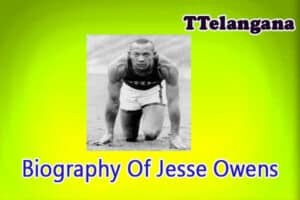Biography Of Jesse Owens
Jesse Owens was a track and field athlete. One of the most memorable moments occurred during the 1936 Olympics in which he was awarded four gold medals, much to the displeasure of Adolf Hitler and the Nazi party, who believed the Olympics could be a demonstration of Aryan dominance. In his later years, Jesse Owens became a goodwill ambassador for America as well as athletics.
“The fights that matter aren’t those that win gold medals. The fights inside you are inscrutable constant battles that are a part of each of us is the place to be.”
Short bio – Jesse Owens
Jesse Owens Jesse Owens was born in Alabama at the age of 9 the family moved into his hometown in the Granville area of Cleveland. His early years were plagued by poverty and he had to do a lot of menial work like delivering groceries and working in the repair shop for shoes. But he could find his passion for athletics and running; early, Jesse was seen as having a lot of potential. In later years he owed a lot of credit to Charles Riley, his high school coach who pushed him to be a better athlete and accepted the difficulty of arranging night training sessions because Jesse worked in a repair shop for shoes.
Jesse Owens rose to national notoriety in 1933 after he broke the record set by his father (9.4 minutes) for the 100-yard sprint. He was a student at Ohio State University but, with no award, he was forced to continue working on a part-time basis. It was the 30s of the 1930s and America had a very separated society. When traveling with his squad, Jesse had to suffer the shame of eating in separate restaurants and staying at various hotels.
One of his most impressive athletic feats was in 1935. In one track event, he broke the world record three times. The three records included the long jump (Owen’s record was held over the last 25 years) 220 yards, and 220 yards hurdles. He also matched the record for 100 yards.
Jesse Owens at the 1936 Olympics
Jesse Owen’s most memorable moment came at the 1936 Berlin Olympics. He took home Olympic silver in the 100m long jump 200m, long jump, and the 4* 100m relay. (An feat that wasn’t matched before Carl Lewis in 1984). It was a convincing denial of the Nazi’s ambitions of showing “Aryan superiority.”. Hitler presented the medals of German participants on an opening day, but after Owen’s triumphs, he made the decision not to award any additional medals. Albert Speer later wrote that Hitler was unhappy at the fact that a negro named Jesse Owens had won so many gold medals.
“….but the man was extremely dissatisfied with the string of wins by the amazing and vibrantly colored American running star, Jesse Owens. People whose ancestors were in the wild were primitive Hitler declared with a shrug. Their bodies were much stronger than the whites who were civilized and therefore should not be allowed to participate in future competitions.”
It’s funny to think that Jesse Owens was treated well throughout his time in Germany He didn’t suffer the discrimination he experienced at home in the United States and many Germans were looking for his autograph.
Biography Of Jesse Owens

In during the Games, Jesse Owens displayed the kind of sportsmanship he was famous for. In the long-jump final the athlete took time to rub his German opponent, Lang. Lang later thanked Lang for the wonderful spirit of sportsmanship Jesse Owens embodied. Jesse Owens was grateful for the friendship Lang showed. Later, Jesse Owens remarked:
“It required some courage to get the man (Lang) to accept me as a friend before Hitler… The truth is that you can melt every medal and cup I have, but they’ll be a relic of the friendship of 24karats I felt for Lutz Long at that moment. Hitler might have been awestruck as we embraced. The sad thing about the story is that I did not see Long again. He was killed during World War II.”
Despite his remarkable athletic feat, Jesse Owens was denied the commercial recognition or accolades that he could be hoping for. He never received the honor of a celebration by F.D. Roosevelt or the next US president. In 1936 in 1936, Roosevelt or future US presidents. In 1936, the American Olympics association rescinded his Olympic status because Owens was unable to travel to Sweden due to the financial necessity to pursue commercial enterprises in America.
Biography Of Jesse Owens
Jesse was required to participate in various “athletic showcases” like running against horses, or racing against local runners, with an initial head start of 10 yards. In the words of Jesse Owens wryly remarked
“After I returned home after the 1936 Olympics with four medalists was evident that everybody was going to slap me in the face, or want for me to hold their hand or take me taken to their suite. However, no one was willing to give me any kind of job.”
He started a business, but the venture was not a success and ended up in the early 1960s in bankruptcy. He was even charged with tax fraud. However, in the year 1966 as protests for civil rights took momentum, Jesse Owens was given the chance to be an ambassador for goodwill to big corporations as well as to the Olympic movement.
Tags: jesse owens,jesse owens biography,biography,jesse owens for kids,jesse owens life story,jesse owens 1936 olympics,jesse owens biography for kids,jesse owens race,jesse owens movie,jesse owens long jump,owens,jesse owens interview,jesse owens documentary,jesse owens (olympic athlete),jesse owens 1936 olympics 100 meter,jesse owens bio,jesse owens trailer,jesse,why did jesse owens die,jesse owens wife,meet jesse owens,jesse owens gold